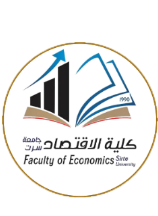The impact of brain drain on building a knowledge society
DOI:
https://doi.org/10.37375/esj.v3i1.1982Keywords:
هجرة العقول – التنمية – مجتمع المعرفةAbstract
The study aimed to attempt to study and analyze the factors and causes affecting the phenomenon of brain drain among faculty members in Libyan universities, as well as to know and analyze the impact of brain drain on building a knowledge society, by taking into account the viewpoints of faculty members: at the Faculty of Economics and Commerce - Al-Marqab University. The problem of the study lies in the answer. It asked several questions, the most prominent of which was: What are the reasons that led to brain drain from the point of view of faculty members at the Faculty of Economics and Commerce - Al-Khoms? The study used the descriptive analytical method. Considering that this approach is appropriate for its purposes, as the number of the study population reached (92) individuals, the study used a comprehensive survey method, a questionnaire form was designed and distributed to the target sample, and (68) individuals were obtained matching the study’s answers and questions, and the researchers used statistical methods. Which suits the study and serves its purposes, which are represented by some measures of central tendency such as the arithmetic mean, the weighted arithmetic mean, the standard deviation, some frequency distributions, the One Sample T test, and the correlation coefficient. The study reached a set of results, the most important of which are: The study showed that more The motives for migration are the desire for scientific development in the field of specialization and to avoid the political and security situation, in addition to the lack of appropriate facilities that encourage scientific research and to improve the financial situation. The study also showed that the most unmotivating reasons for practicing current jobs efficiently are the academic defect in Libyan universities and the work of the principle of administrative bureaucracy in Administration, the inability of universities to absorb creative energies, the lack of a suitable climate for conducting scientific research, and the lack of balance between education systems and development projects
References
أولا – المراجع العربية :
- اشتيوي، علي ناصر (2014) المعرفة وإدارتها في مؤسسات التعليم العالي الأردن، دار الحامد للنشر والتوزيع.
- البدراني، عبد الناصر (2009) هجرة الكفاءات العربية الأسباب والنتائج العراق أنموذجاً، رسالة ماجستير منشورة، الأكاديمية العربية المفتوحة، الدانمرك.
- الخالدي، نبيل عمران موسى (2016) إسهامات الجامعات العراقية في بناء مجتمع المعرفة، جامعة القادسية، كليةالآداب.
- الخشاب، عبد الإله . ( 2000 ( الجامعة في خدمة مجتمع المعرفة، الإسكندرية، جامعة الإسكندرية
- الملحم، إسماعيل (2008) الإنسان والتربية في عصر المعلومات، دمشق، دار علاء الدين.
- الملكاويي، إبراهيم خلوف (2007) إدارة المعرفة الممارسات والمفاهيم، عمان، دار الوراق.
- الخلايلة، هدى احمد(2010) هجرة الكفاءات العلمية والفكرية العربية، أسبابها ونتائجها، مجلة اتحاد الجامعات العربية.
العدد (55).




































